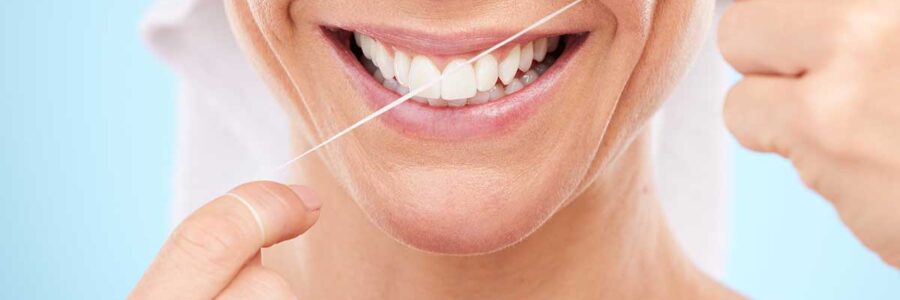You’ve swapped out toxic skincare products for clean beauty options and ditched plastic water bottles for reusable ones—but what about your dental floss? This often-overlooked product may expose you to toxic chemicals like PFAS and microplastics, undoing some of your efforts to live a cleaner, healthier life. Let’s uncover the truth about what’s lurking in traditional dental floss and explore safer, eco-friendly alternatives.
PFAS in Dental Floss: A Hidden Health Risk
Many people are surprised to learn that some of the most popular dental floss brands, including Oral B Glide, contain per- and polyfluoroalkyl substances (PFAS). These “forever chemicals” are highly resistant to breaking down in the environment and your body.[1] Oral B Glide floss is made from Teflon, which allows it to slide easily between teeth but also exposes you to harmful chemicals each time you floss.
The health risks of PFAS are well-documented and include:
- Cancer
- Liver damage
- Hormonal disruption
- Weakened immune function
- Increased risk of fertility issues
This is particularly alarming because floss is used inside the mouth, where toxins can be absorbed directly into the bloodstream.
Microplastics: Another Hidden Danger
If your floss doesn’t contain Teflon, it may pose a risk using synthetic fibers like nylon or polyester. These plastic-based materials can shed microplastics as you floss, which may enter your bloodstream and accumulate in your body over time.
Microplastics have been shown to cause inflammation, disrupt hormones, and potentially contribute to long-term health problems. If you’ve ever noticed your gums bleeding during flossing, this can provide a direct entry point for these harmful particles into your system.
How to Choose Non-Toxic Dental Floss
Switching to a non-toxic, eco-friendly dental floss is an easy step towards a cleaner lifestyle. Look for floss that avoids plastic fibers, harsh chemicals, and synthetic coatings. Here’s what to keep in mind:
- Natural Fibers: Silk and bamboo are excellent alternatives to synthetic materials like nylon or polyester. These natural fibers are biodegradable and gentle on the gums.[2]
- Non-Toxic Coatings: Traditional flosses are often coated with synthetic waxes, which can be harmful. Opt for floss coated with beeswax or candelilla wax for a smooth, non-toxic alternative.
- Sustainable Packaging: Many non-toxic floss options include eco-friendly packaging, such as glass containers or cardboard dispensers, reducing your plastic footprint.
Brands That Get It Right
Ready to switch up your dental routine? These non-toxic floss brands offer effective alternatives without the harmful side effects:
- Cocofloss: Made with coconut oil and free of PFAS, this dentist-approved floss is both effective and safe.[3]
- Radius Natural Silk Floss: A biodegradable floss made from silk and coated with beeswax, offering a clean and natural way to floss.[4]
- Bamboo Floss: This sustainable option is made from biodegradable bamboo fibers and coated with non-toxic wax.
Conclusion: It’s Time to Rethink Your Floss
Flossing is critical to maintaining oral health, but your choice of floss can make a big difference for your overall wellness. By switching to non-toxic, natural floss options, you can avoid the hidden dangers of PFAS and microplastics while still caring for your teeth.
References:
- Boronow, Katherine E., et al. “Serum Concentrations of PFASs and Exposure-Related Behaviors in African American and Non-Hispanic White Women.” Journal of Exposure Science & Environmental Epidemiology, vol. 29, no. 2, 2019, pp. 206–17. PubMed Central.
- Abed, Rawan, et al. “An Environmental Impact Study of Inter‐dental Cleaning Aids.” Journal of Clinical Periodontology, vol. 50, no. 1, Jan. 2023, pp. 2–10. PubMed Central.
- Does Cocofloss contain any PFAS?https://help.cocofloss.com/hc/en-us/articles/360015655034-Does-Cocofloss-contain-any-PFAS.
- The Benefits of Using Natural and Organic Materials in Floss.” RADIUS, https://madebyradius.com/blogs/good-to-know/the-benefits-of-using-natural-and-organic-materials-in-floss. Accessed 20 Sept. 2024.


